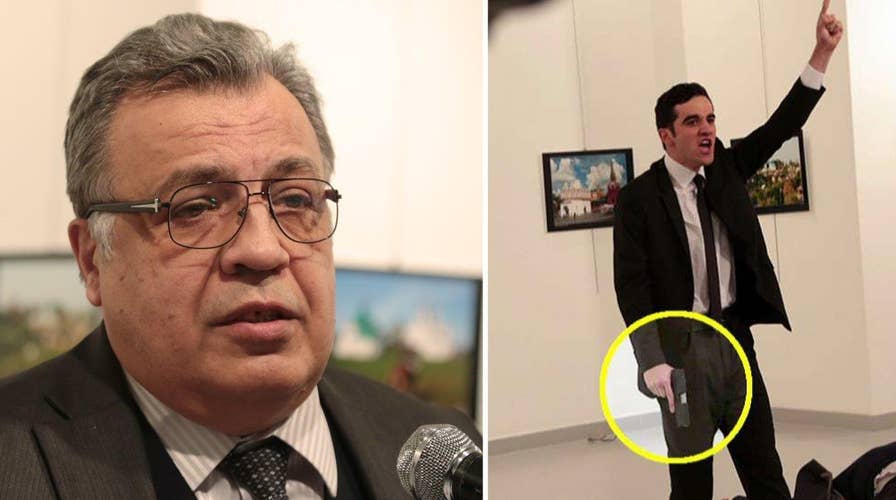Russian ambassador to Turkey assassinated in Ankara
Report: Gunman shouted 'Allahu Akbar' and 'don't forget Aleppo'
The assassination of a Russian diplomat Monday in Ankara was chillingly captured on camera, but Turkish officials say the real motive of the killer, who shouted "Allahu Akbar" and claimed to be avenging attacks on Aleppo, remains unclear.
Authorities say it's unlikely the assailant acted alone, however, it's unclear who may be behind the attack. Speculation has ranged from a shadowy, exiled opposition leader to Islamic extremists.
Even the CIA has been floated as possibility.
Authorities quickly named Turkish police officer Mevlut Mert Altintas, 22, as the apparent Islamist gunman who murdered Russia’s ambassador to Turkey, Andrei Karlov, during an art show. Altintas yelled “Allahu akbar” and specifically mentioned the besieged Syrian city of Aleppo after shooting Karlov in the back, but no terror group has yet taken credit for the attack.
A senior Turkish government official described the killing as "fully professional, not a one-man action" and said the attack was well-planned, though he did not say who may have coordinated with Altintas.
That vacuum of information has left room for pro-government forces to speculate Altintas was linked to Fethullah Gulen, a Muslim cleric living in exile in Pennsylvania. Gulen, through an adviser, denied those allegations and told Reuters he “categorically” condemned the “heinous act.”
Turkey’s pro-government newspaper Yeni Safak ran a story claiming Karlov’s killing was a plot by a U.S. intelligence agency that was carried out by Gulen’s movement.
“Great Sabotage,” Yeni Safak said in its headline.
Russian President Vladimir Putin called Karlov’s killing “a terrorist attack” and said Russian investigators had been sent to Turkey to assist in the investigation.
PUTIN VOWS REVENGE FOR AMBASSADOR'S MURDER
“We have to know who organized the killing, who gave orders to the assassin," Putin said.
So far, any evidence linking Altintas and Gulen appears circumstantial.
Turkey’s government believes Gulen has created a parallel network of dedicated followers in the country’s military and police forces, something which Gulen denies, but that appeared to be exposed during a failed coup on July 15. The brief uprising has led to mass purges of military and civil agencies throughout the country and the imprisonment of tens of thousands of suspected members of the “Gulenist Terrorist Organization,” or FETO.
Altintas was a member of the riot police for 2 ½ years and, officials told Reuters, took a holiday from July 15-17. The government could assert this showed Altintas knew about the coup attempt beforehand.
“The people he lived with before school were detained over FETO. It was determined that the people with whom he graduated from school were from a FETO team,” a senior security official told Reuters about the attacker.
“Information was obtained to the effect that people who helped him get into school were from FETO. There are very strong signs that the person who carried out this attack was from FETO. The investigation is currently focused totally on this.”
The Associated Press contributed to this report.





















